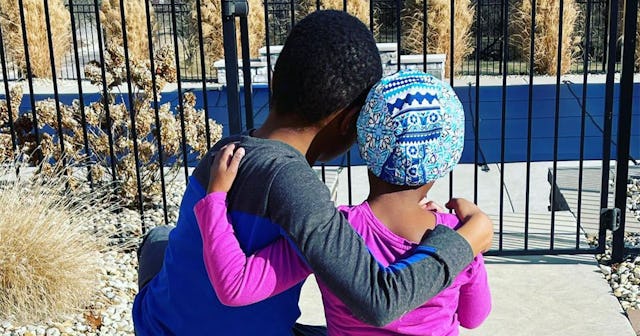We Should Try To Take The '1000 Hours Outside' Challenge––Here's Why

Instead of another one of the classic resolutions for 2021, given the raging coronavirus pandemic and our increasing screen time, what if we decide to log 1000 hours outside this year? Yes, you read this correctly.
I know. 1000 hours is a lot. A quick math check will tell you that’s 2.7 hours a day spent in the great outdoors. Before you write this off as completely ridiculous and impossible, consider that it can do a lot for you and your family’s mental health, and that time spent outside doesn’t have to be something elaborate or carefully coordinated. It can be as simple as reading a book outside, or walking around barefoot in the grass.
1000 Hours Outside is a global movement started by a family with the goal of transforming lives by utilizing outdoor time to personally thrive, including “academically, socially, emotionally, and physically.” The creator shares that “big, beautiful, bountiful nature—is the absolute and very BEST reprieve for you and your children.” They aim to get outside about twenty hours a week, and they want us to do the same.
I know, this sounds wonderful in theory. Cue mental images of Maria and the von Trapp children frolicking in the sunshine and singing. It’s all a bit Disney, isn’t it? I decided that if I am going to commit to getting my kids outside more often, I need to know that this 1000 Hours thing is legit. Because like you, we’re trying to navigate working, schooling, and living during global pandemic. Can we really prioritize more outdoor time every day? Is it worth it? Plus, if I’m being honest, my couch, Netflix, and a blanket are a lot more appealing.
I checked in with Dr. Sanam Hafeez, a neuropsychologist and faculty member at Columbia University, to find out exactly why my family (and yours) should consider the 1000 Hours Outside challenge.
The Many Benefits Of Being Outdoors
For starters, being outside can improve the symptoms of both anxiety and depression, according to Dr. Hafeez. She shared that there’s not a 100% clear reason how outdoor time helps, but she references a 2015 study in which researchers had subjects walk 90 minutes in either a natural or urban setting. Those that participated in the nature walk “had lower activity in the prefrontal cortex, a brain region that is active during rumination—defined as repetitive thoughts that focus on negative emotions.” Getting outdoors and being in nature “can restore our mood, give us back our energy and vitality, refresh and rejuvenate us.”
How Many Hours We Should Spend Outside
Dr. Hafeez said the ideal amount of outdoor time is three hours a day. (Yup, she echoed what’s shared by 1000 Hours Outside.) However, she acknowledges that winter weather might make this quite unrealistic right now. She suggests we spend an hour a day in the fresh air, walking or playing in an open space such as a playing park or field, if possible. This time helps us with the cabin fever so many of us are experiencing right now. Additionally, if we can get outdoors during the daylight hours, we’re getting the benefit of vitamin D from the sunlight. Plus, many of us are feeling lethargic from the abundance of screentime. Outdoor time is energizing while screentime is energy-depleting.
Spending Time Outside Is More Important Than Ever Before
Because of COVID-10, we don’t have our usual change of scenery. Perhaps you were used to commuting to work, shopping, visiting family and friends, going on vacations, dining indoors at a restaurant, seeing a movie in a theatre, and sending your children to in-person school. Now, many of us are “left in one-dimensional worlds” where we spend hours on end inside of our homes. If we go outside, we safely change our scenery and reconnect with other people, even if it’s simply by seeing them from a distance. Going outside “lessens feelings of isolation.”
Other Ways to Boost Our Mood
Dr. Hafeez shares that outdoor time isn’t the only way to feel better. She advises us to consider exercise to raise endorphin levels, watching something funny, and cuddling your pet. She also recommends considering service to others, because in volunteering our time you can “get out of your own head” and boost your mood. Also, doing a creative activity, even just trying a new recipe or tackling a project, can feel good because you’re accomplishing. Don’t underestimate the power of a warm bath, and consider re-organizing or de-cluttering a space in your home. By doing so, you’re controlling a little bit of chaos.
If you’re anything like me, I prefer to get my kids moving, especially outside. It improves their attitudes and helps them fall asleep easier. Plus, taking a break from screens, either from working or remote-learning, makes us all happier. These outdoor adventures not only help us clear our minds and get out of the pandemic rut, but they also help us avoid tech neck, an increasingly common issue.
In essence, there’s not a downside to spending more time outdoors. You and your entire family can benefit in many ways, including mentally and physically. During the pandemic, we have to be more cautious and creative, but outdoor time is still doable. As far as reaching 1000 outdoor hours this year, it’s far too early to tell. Though in the case of managing our lives during the pandemic, some outdoor time is better than none at all.
Spending time outdoors, exercise, and other coping mechanisms to boost our mental health are not a replacement for therapy, medication, etc. If you’re struggling, make sure to talk to your doctor asap.
This article was originally published on